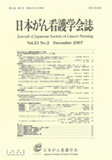Japanese
English
- 販売していません
- Abstract 文献概要
- 参考文献 Reference
- サイト内被引用 Cited by
要旨
本研究の目的は,食道切除術に加え喉頭合併切除術を受けた食道がん患者の体験を明らかにし,患者に必要な看護援助のあり方を検討することである.
疾患や治療について術前に医師から伝えられた内容,喉頭切除術の必要性を説明されたときの気持ち,手術を受けることを決めた要因,術後声が出ないことを自覚したときの気持ち,失声以外で日常生活を送るうえで困難と感じたことや,それに対する生活上の工夫などについて,半構成的質問紙を作成し,自由回答法による半構成的面接を実施した.面接時の主たる意思疎通方法は口話法としたが,喉頭切除術を受けている対象者であることから,筆談・ジェスチャーを併用し,対象者の語りの内容を研究者が復唱して確認し,筆記しながら面接を実施した.
面接時に得られた全筆記内容について,内容分析の手法を参考にして分析した結果,食道切除術に加え喉頭合併切除術を受けた患者の体験として,【呼吸・感覚・食に関する煩わしい症状を抱え込む】【これまでどおりの方法では暮らせないことに困惑する】【言語を用いた意思表示・意思疎通ができないことへいらだち,悔しい思いをする】【他者に迷惑をかける存在と化した自分へ嫌悪を感じる】【“がん”ゆえに死への恐怖を払拭できない】【造設された気管口に平然としていられない】【同病者の体験を参考にして日常生活行動の一つひとつを自分流に工夫する】が得られた.
Abstract
The purpose of this study was to assess the experiences of esophageal cancer patients undergoing both esophagectomy and laryngectomy, and to identify the appropriate nursing intervention for these patients.
A semi-structured questionnaire was designed to gather the following data : disease information, and therapy received from the attending physician prior to surgery; patient feelings when told of the necessity for laryngectomy; factors that influenced the decision to undergo surgery; feelings postoperatively due to loss of voice; difficulties related to activities of daily living other than loss of voice; and lifestyle modifications made to cope with limitations due to surgery. Each patient was interviewed using open-ended questions, guided by the questionnaire. Verbal language was the main mode of communication during the interviews. Because the subjects had undergone laryngectomies, we confirmed the contents of interviews through writing and gesture.
Content analysis of the interviews was used to define the following seven major categories related to the experiences of esophageal cancer patients: "have burdensome symptoms related to respiration, sensation or eating"; "have difficulty accepting that they can not resume their previous lifestyle"; "become angry and frustrated when unable to communicate verbally"; "feel self-hatred for troubling other people and living with a surgically altered body part"; "have a continued fear of cancer and death"; "can not calmly accept the surgically constructed tracheal stoma"; and, "individually modify each activity of daily living based on the experiences of other patients in the same situation".
Copyright © 2007, Japanese Society of Cancer Nursing All rights reserved.


